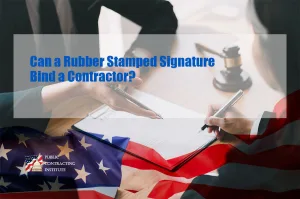Is a rubber stamped signature of the President of a company on a release of claims valid? The Civilian Board of Contract Appeals, under the facts in Penna Group, LLC v. Dept of Justice, CBCA 6155, Sept. 27, 2018, held that it was a valid release after completion of a roofing contract.

The Federal Bureau of Prisons (part of the Department of Justice) awarded a roofing contract to Penna Group. Upon completion of the work, the agency provided Penna with a completed release of claims form that released the United States from any and all claims arising under the contract or any modification or change, with the word “NONE” to identify the claims excluded by the contractor.
Penna returned the document with the stamped signature of its President, as placed there and witnessed by an employee of Penna, in order to receive final payment under the contract. The agency received the release and made the final payment. Several years later, Penna submitted a certified claim for $146,048 for what was described as costs incurred in performing an “expanded scope of work under the roofing contract.” Relying on the signed release, the contracting officer denied the claim.
The issue before the Civilian Board was simple: was the release of claims by Penna valid, having been placed there by a rubber stamp used by Penna’s employee, a project manager? The President submitted an affidavit stating that:
- Penna is a single member LLC and only the President of Penna is authorized to sign a release
- The President did not authorize or sign the release
- The project manager mistakenly and without authorization affixed the President’s signature stamp on the release
- The President never received a notice of release until after the claim had been filed (although the Board noted that the project manager provided an emailed copy of the release to the President some 2½ years earlier, in the same email it sent to the agency enclosing the stamped release)
The Board denied the claim, relying on the release. It noted that a company acts through its employees and agents, and the President was aware that the project manager had the signature stamp, which endowed her with the apparent, if not actual authority to use it. The Board found it negligent of the President to provide the project manager with a stamp that could be used without his knowledge or instruction, not to oversee its use, and to permit the individual with the stamp to witness the signature. The project manager timely provided the president with a copy of the release, and the President waited 2½ years to raise the issue. The Board concluded that the “agency is not at fault for the President’s failure to receive, review or to act on the information [and] appropriately relied on the signature in closing out the contract.”
The Takeaway: First, authorizing use of a rubber stamped signature by an employee in your company can be very dangerous. In today’s modern world, communications can be sent instantly anywhere, and actual signatures can be obtained when needed. But if you permit the use of a rubber stamp: (1) explicitly outline the limits of authority to use that stamp, in writing, in a company document; (2) insist that the authorized user obtain a witness other than himself/herself to the stamp; (3) require that the user of the stamp immediately and clearly communicate to the officer any time the stamp is used. The officer of the company should immediately advise a contracting officer if a stamped signature had been improperly affixed on a company document.
For other helpful suggestions on government contracting, visit:
Richard D. Lieberman’s FAR Consulting at https://www.richarddlieberman.com/, and Mistakes in Government Contracting at https://richarddlieberman.wixsite.com/mistakes/.
